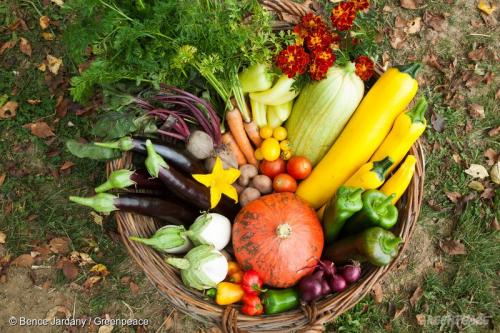Environment and health concerns ignored by EU agriculture ministers
A statement by European agriculture ministers on the EU’s common agricultural policy (CAP) ignores the impacts on public health and the environment, according to Greenpeace.
The text comes ahead of the EU Commission’s proposed CAP reform, due in May. Agriculture ministers failed to address the environmental and health impacts of Europe’s farming system, and in particular of its intensive meat and dairy sector.

Marco Contiero, agriculture policy director at Greenpeace EU, said: “Animal farming contributes as much as 17 per cent of the EU’s greenhouse gas emissions, and is a major source of water, soil and air pollution. The upcoming reform of EU farming rules is as important for citizens’ health, Europe’s climate action and nature protection, as it is for farmers. Our food and farming system needs a cure, not a sticking plaster, and yet today’s meeting of agriculture ministers looked little more than that.”
Environment and health impact of meat and dairy
Animal farming in Europe contributes 12-17 per cent of the EU’s greenhouse gas emissions. It is also a major source of water, soil and air pollution, in particular from nitrogen and phosphorus in water, and ammonia and fine particulate matter in the air. Nitrogen pollution alone costs the EU up to €320 billion every year.
The European Food Safety Authority and the European Centre for Disease Prevention and Control described antibiotic resistance as “one of the biggest threats to public health”, echoing statements by the World Health Organization. A joint report by the two agencies confirmed the presence of bacteria in farmed animals that have developed resistance to crucial antibiotics used to treat people.
Greenpeace is calling for a 50 per cent reduction in global meat and dairy production by 2050, to protect the climate, environment and public health.
Next steps
On 3 May, the European Commission will publish its proposal for the EU budget, the so-called multiannual financial framework. The common agricultural policy makes up almost 40 per cent of the budget. On 29 May, it will table its proposal for the reform of the CAP.
The European Parliament’s agriculture committee is set to vote on an non-binding opinion on the CAP on 17 May. Once the Commission has published its CAP proposals, the Parliament will decide which committees will debate and amend the proposals.
Source: Greenpeace European Unit
- 282 reads
Human Rights
Conscience, Hope, and Action: Keys to Global Peace and Sustainability

Ringing FOWPAL’s Peace Bell for the World:Nobel Peace Prize Laureates’ Visions and Actions

Protecting the World’s Cultural Diversity for a Sustainable Future

The Peace Bell Resonates at the 27th Eurasian Economic Summit

Puppet Show I International Friendship Day 2020

